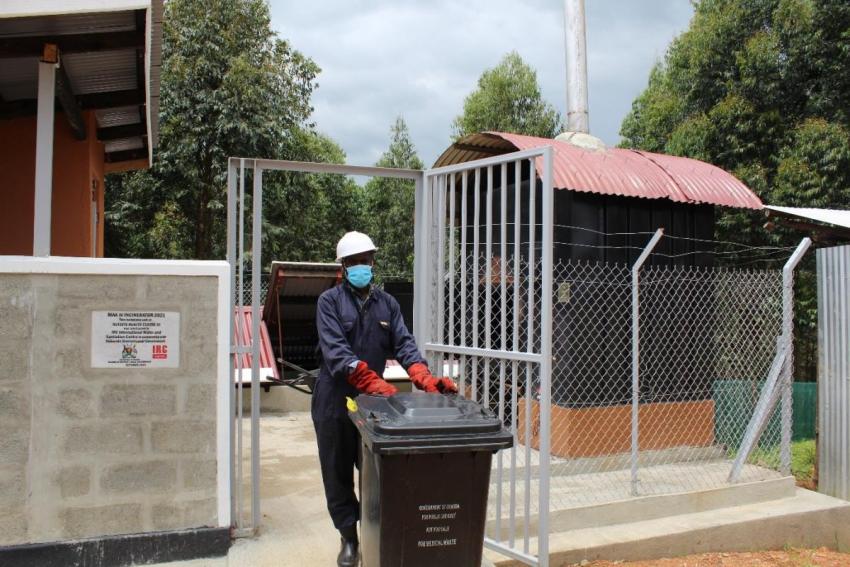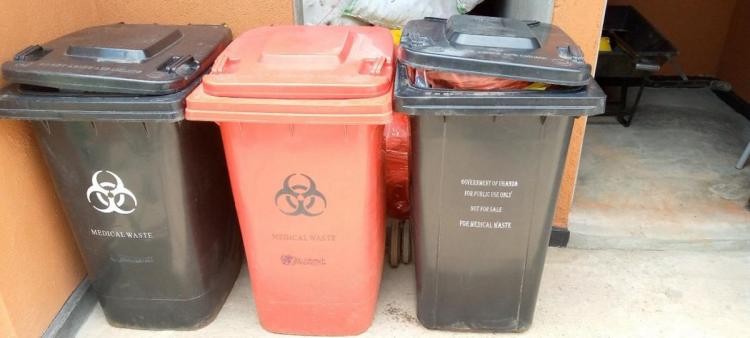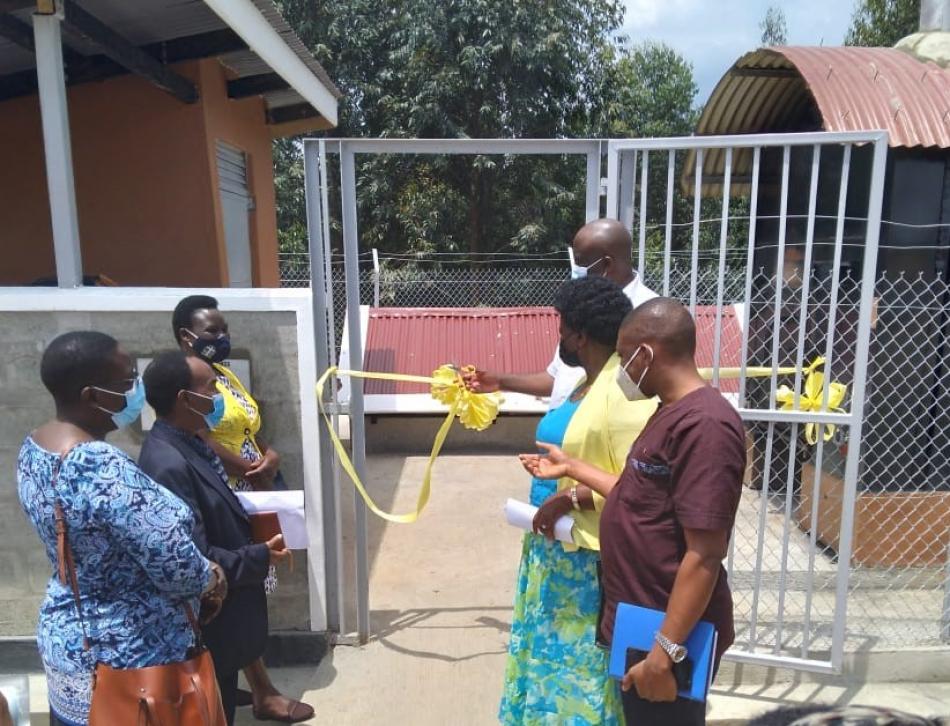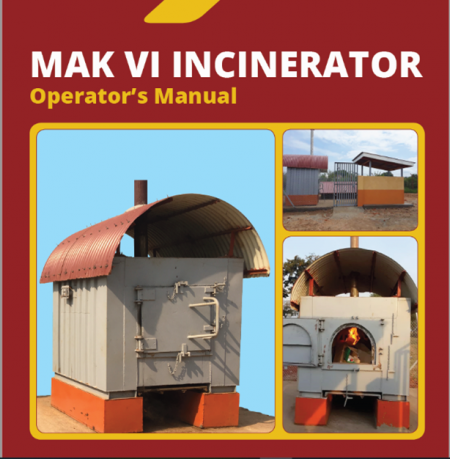
A much needed medical waste incinerator for safe disposal was commissioned for Ruteete Health Centre III in Kabarole District, Uganda.
Published on: 17/11/2021
Anthony Tweheyo, a cleaner at Ruteete HCIII was trained and now takes on responsibility as operator of the incinerator.
Photo by Naomi W. Kabarungi/IRC Uganda
Over the last couple of years as the world has been dealing with the COVID-19 pandemic, the importance of improved Water, Sanitation and Hygiene (WASH) practises in health care facilities (HCFs) has become even more pronounced. While we did not anticipate the pandemic, our interventions in our partner district Kabarole benefited from the baseline study on the state of WASH in health care facilities in Kabarole District. This study was conducted in 2019 jointly by IRC, Kabarole District Health Department and the Centers for Disease Control and Prevention (CDC). It revealed enormous gaps with regard to governance and access to WASH and Infection, Prevention and Control (IPC) services.
The study made recommendations to ensure safety of health care workers, patients and care givers by installing facilities to ensure uninterrupted safe water supply, access to safe sanitation facilities, handwashing facilities in key patient care points, and professional medical waste management including colour coding, waste segregation and safe elimination of sharps waste and non-sharps infectious waste in covered, lined pits or incinerators that are inaccessible to the public.
Guided by the recommendations, IRC has since supported the district with a number of initiatives including the provision of handwashing facilities, safe water filters for drinking water and Personal Protection Equipment (N95 respirators masks, surgical masks, gloves, temperature guns, gum boots, aprons, overalls) to all the 54 HCFs. IRC has also supported the construction and rehabilitation of safe sanitation facilities in several HCFs, and the production and distribution of Alcohol Based Hand Rub (ABHR).

Colour-coded bins for waste segregation at Ruteete. It is a standard requirement by MOH for all HCFs to ensure separation of waste according to safety levels.
Most of these interventions were contributions to existing efforts. While waste segregation standards were generally well maintained, medical waste disposal in health care facilities remained a challenge. For many years health care facilities in Kabarole had no incinerators on site and infectious medical waste was disposed of by burning in open pits within the facility premises. This is hazardous to the community, clients, health workers and support staff who are exposed to dangerous fumes and sharp particles.
The Ministry of Health recommends that in densely populated areas centralised pyrolytic incinerators reaching 850°C and above should preferably be used while dealing with Class 2 infectious (clinical) waste, according to the guidelines on health care waste management, MOH, 2009.

Kabarole Chairman Hon Rwabuhinga cuts the ceremonial tape to launch the new incinerator, with (L-R) Cecilia Birungi, DHI; Alexander Kikwaya, Deputy CAO, Jane Mulumba, IRCJuliana Ayesiga, Resident District Commissioner and Brian Kisembo Acting DHO. Photo by David Ndamira/IRC Uganda
In October 2021, responding to requests and proposals from the District Health Department, IRC supported the construction and installation of a MAK incinerator costing over UGX 100 million at Ruteete Health Centre III (HCIII) complete with a waste shed, ash pit, tools store, a chain link fence and a one-year warranty against defects. This is presently the only incinerator in the district licenced to dispose of medical waste. The incinerator is centrally located with mechanisms to enable accessibility and use by other HCFs in the district.
The incinerator is a MAK IV Model SS8, constructed and supplied by Technology for Tomorrow Africa (T4T), a reputable company with affiliation to Makerere University College of Engineering, Design, Art and Technology. After installation, T4T trained one operator to ensure proper operations and maintenance of the unit. But plans are under way to retrain the operator, and also train at least two more operators.
At the ceremony held on Wednesday 27 October 2021 to commission the incinerator at Ruteete HCIII, district leaders appreciated IRC’s support towards improving WASH in the district, in line with the Kabarole District WASH Master Plan.
Brian Kisembo, the acting District Health Officer emphasised that medical waste is a biohazard which if not managed well, could result in serious health challenges for all users of health facilities including the workers and patients. He thanked IRC for supporting Kabarole District with colour-coded medical wastebins, handwashing facilities, capacity building for health workers on WASH and IPC, and transforming at least five health care facilities into model facilities.
On behalf of the District Health Department, Kisembo pledged to put the incinerator to good use, and ensuring proper operations and maintenance. He requested for more assistance, especially the transportation of waste from the neighbouring health facilities, bin liners and refresher trainings in waste management for all health workers in the facilities.
The Deputy Chief Administrative Officer Mr. Alexander Kikwaya reiterated the importance of medical waste management as a key component of any health care facilitator. He stressed that an incinerator of such capacity will not only ensure proper waste management for Ruteete HCIII, but for the other nearby health facilities as well.
The Ruteete HCIII In-Charge, Mr Thomas Mugisa, commended the contractor for keeping his word and completing the installation of the incinerator in time. He committed to working with the District Health Inspector to ensure monitoring of the incinerator and coordinating the work of the incinerator operator.
Before officially commissioning the incinerator, the District Chairperson, Hon. Richard Rwabuhiinga, thanked IRC for easing the burden of waste management, which he said was a challenge to ensuring health and water for all by 2030. He stressed that the incinerator would ensure friendly health centres and reduce the volume of hazardous medical and biological waste not only at Ruteete HCIII but also in the entire district.

Cover of the MAK IV incinerator operator's manual
Closing the commissioning ceremony, the Kabarole Resident District Commissioner Mrs. Ayesiga Juliana Sarah commended IRC for supplementing Government by improving health services in the district and delivering projects that are visible and traceable. She stressed the importance of professionalism and quality service delivery as indicated by IRC, commending the contractor for making necessary adjustments to ensure that the incinerator can withstand earthquakes which the region is prone to and which can compromise sustainability.
It is intentional to mention names and quote the various speakers at the commissioning ceremony. The enthusiasm of both technical and political leaders of Kabarole District towards achieving universal access to health and WASH in the district is noteworthy and the progress evident. This we believe, points to the commitment the district has in ensuring quality WASH services, and the willingness to be held to account on service delivery.
As IRC Uganda we are grateful for the relationship with the district and the opportunity to contribute towards the targets of the WASH Master Plan. The incinerator at Ruteete is a valuable response to the need and request from Kabarole District local government to control and manage medical waste, a serious challenge in improving health in the district. I, on behalf of IRC, committed our continued support in sensitisation and optimal use of the incinerator. I urged the district to ensure maintenance and sustainability of the incinerator, using the Operator’s Manual provided by the contractor.
At IRC we have strong opinions and we value honest and frank discussion, so you won't be surprised to hear that not all the opinions on this site represent our official policy.